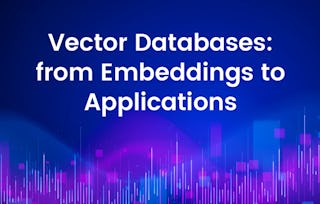Vector databases use embeddings to capture the meaning of data, gauge the similarity between different pairs of vectors, and navigate large datasets to identify the most similar vectors. In the context of large language models, the primary use of vector databases is retrieval augmented generation (RAG), where text embeddings are stored and retrieved for specific queries.
Building Applications with Vector Databases

Building Applications with Vector Databases

Instructor: Tim Tully
Access provided by Coursera for Reliance Family
1,777 already enrolled
(17 reviews)
Recommended experience
What you'll learn
Learn to create six exciting applications of vector databases and implement them using Pinecone.
Build a hybrid search app that combines both text and images for improved multimodal search results.
Learn how to build an app that measures and ranks facial similarity.
Skills you'll practice
- Generative AI
- AI Personalization
- Application Design
- Semantic Web
- Embeddings
- Retrieval-Augmented Generation
- Image Analysis
- Natural Language Processing
- Anomaly Detection
- LLM Application
- Vector Databases
- Skills section collapsed. Showing 10 of 11 skills.
Details to know
Only available on desktop
See how employees at top companies are mastering in-demand skills

Learn, practice, and apply job-ready skills in less than 2 hours
- Receive training from industry experts
- Gain hands-on experience solving real-world job tasks

About this project
Instructor

Offered by
How you'll learn
Hands-on, project-based learning
Practice new skills by completing job-related tasks with step-by-step instructions.
No downloads or installation required
Access the tools and resources you need in a cloud environment.
Available only on desktop
This project is designed for laptops or desktop computers with a reliable Internet connection, not mobile devices.
Why people choose Coursera for their career

Felipe M.

Jennifer J.

Larry W.




